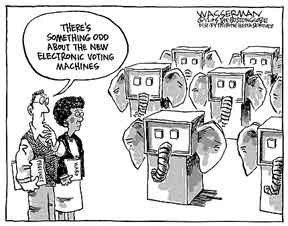South Carolina’s system causes particular concern
A group of state-based civic organizations has urged presidential candidates to call for paper ballots in all 2008 primary elections.
In a letter sent to the major Democratic and Republican candidates last week, the groups Georgians for Verified Voting, Iowans for Voting Integrity, the North Carolina Coalition for Verified Voting, and the South Carolina Progressive Network offered evidence of the unreliability of paperless electronic voting systems, and expressed special concern about the paperless machines to be used statewide in South Carolina’s presidential primaries on Jan. 19 and Jan. 26.
“Many of the world’s best computer scientists have concluded that paperless e-voting systems are vulnerable to error and fraud,” said Brett Bursey, director of the South Carolina Progressive Network. Last year, a task force that included Howard Schmidt, former chief security officer of Microsoft, called strongly for voter-verified paper records of each vote cast.
South Carolina is of particular concern because of its early position in the front-loaded primary calendar, and because the entire state uses a discredited paperless touch screen system, the ES&S iVotronic. A review ordered by Ohio’s top election official and published on December 14 found found “critical security vulnerabilities” in the iVotronic. Among the problems was a finding that the iVotronic can be manipulated by a person with a magnet and a personal digital assistant. After the Ohio report was published, Edward Felten, head of the Center for Information Technology Policy at Princeton University, wrote that the iVotronic is “too risky to use” in elections. Ohio Secretary of State Jennifer Brunner has recommended scrapping all touch screens, including the iVotronic. Colorado Secretary of State Mike Coffman decertified the iVotronic on December 17, and also wants to switch his state to a paper ballot system for the November election.
“South Carolina has the Ford Pinto of voting systems,” Bursey said.
State Senator Phil Leventis (D Sumter) has sponsored legislation calling for all SC voting machines to produce a voter-verifiable paper ballot that can be used in the event of a recount or polling place problems. “Free, fair and open elections are the foundation of our democracy,” Leventis said. “Unverifiable voting machines are undermining our confidence in elections. The loss of confidence in our election process is undermining our democracy. I can get a paper record with a $10 ATM withdrawal. Why shouldn’t I get one with my vote?”
Leventis is also concerned about the secret nature of the machines all South Carolinians will use to vote. “The only people who know what goes on inside the black boxes that count our vote are the people who sell them,” Leventis said. “I am uncomfortable with private companies running our voting system as a proprietary, for-profit operation.”
Even before the Ohio report, the iVotronic was no stranger to controversy. In November, the Republican Party of Wharton County, Texas, decided not to use the iVotronic in the March 2008 primary after reports of vote-flipping in the November 2007 elections. The iVotronic was the machine used in the 2006 Congressional election in Sarasota County, Florida, where an implausible number of under votes remains unexplained. The iVotronic was also the subject of reports of vote-flipping in a number of states in 2006, including South Carolina. “We had a number of calls on our Election Protection Hotline in 2004 and 2006 with complaints that the iVotronic kept changing the candidate that the voter was trying to choose,” Bursey said.
South Carolina does require that polling places have paper ballots on hand in case of equipment problems, so the state would not necessarily have to start from scratch if it does not use the iVotronic in the primaries. “We respect the burdens election officials face, and switching voting methods on short notice is a very big deal,” Bursey said. “We have, however, been pointing out the potentially fatal flaws in this system since we opposed its purchase in 2003.”
“It is not acceptable to run presidential primaries on systems as vulnerable as our paperless electronic machines,” Sen. Leventis said. “America’s voters deserve a verifiable nominating process.”

